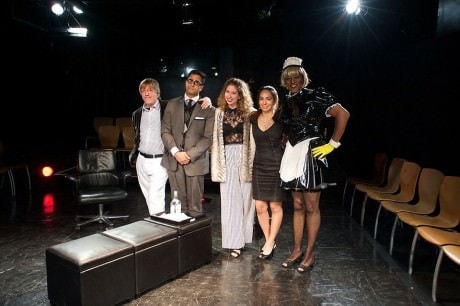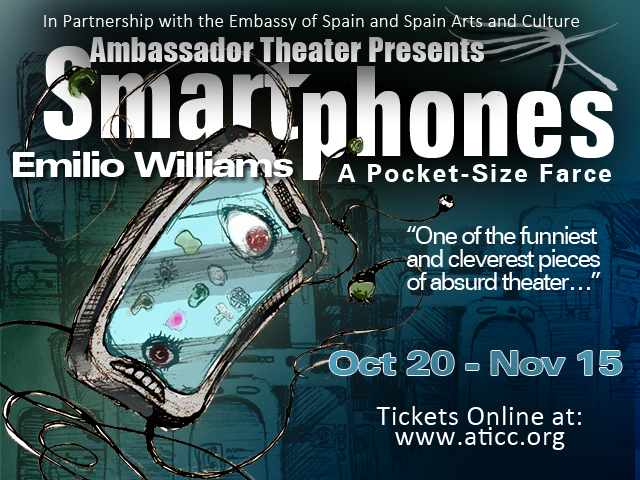Smartphones, A Pocket-Size Farce – produced by and Ambassador Theater in partnership with the Embassy of Spain and Spain arts and Culture, directed by Helen Hayes Award recipient Joe Banno – opens at The Mead Lab Flashpoint on October 22, 2015.
Doesn’t existence seem totally absurd at times and life too restrictive? Don’t we wish we were free of social norms and do as we like? Aren’t we our own worst enemies at times? Emilio Williams*, the author of Smartphones, asks the same questions yet as a dramatist has the opportunity to dream our dreams and nightmares on stage. In Smartphones, inspired by Samuel Beckett’s Waiting for Godot, the avant-garde playwright takes his privilege to the absurdist limit. Mixing the Absurd, Ridiculous and the Surreal with a layer of ‘digital madness’, he brings human shadows and insecurities to light, making us reflect on life and to laugh, nervously at times, in the process.
Emilio Williams is a dramatist who uses his medium like a magnifying glass, bringing into focus complex aspects of our psyche challenged by today’s fast-paced existence. Just like his influences – Beckett, Ludlam, Moliere, and Bunuel, he is acutely aware of what is difficult, awkward and absurd in life and chooses to talk about it using humor, farce and parody. “Nothing is more radical than humor” says Williams, whose multi-dimensional plays combine laughter with existential themes and a pertinent social satire. Smartphones, his only play that takes part in one set, one room and in real time, is also a great example of Williams’ reaction against conventions of the Realistic Theater.
“Your comedies tend to be silly but not stupid” said William’s friend once, and the author liked the comment. In case of Smartphones silly and serious go together. After all the play is a tribute to and a parody of the Theatre of the Absurd, as well as an example of William’s avoidance of literalness of theater realism. Also, true to the Theater of the Ridiculous Manifesto and its canon of ‘the free person,’ Smartphones’ personas are free to act in a spontaneous and silly way whilst not compromising seriousness of the matter. “The free person, as distinct from an authoritarian phony or the civilized adult, is erotic, socially self-assertive, playful and imaginative” (Brecht: 117) and so are the play’s characters.
Chantal and Dagobert, Amelia and Barnaby are stuck together in their friend’s house waiting for his arrival. The couples, educated and socially assertive, reveal their true, outrageous colors as the play progresses. Their neurosis, lies and hidden desires come to the surface taking us by surprise and shocking with their boldness, yet feeling strangely familiar or attractive at the same time. How reassuring and cathartic is to see our own shadows and shameful secrets reflected in other people and our faults and obsessions appearing ‘normal’ and symptomatic of the times. After all, aren’t we, the civilized humans, soldiers in the universal battle to maintain balance between primal desires and social norms?

Smartphones’ characters are in their 30s and 40s and have a lot in common with the Millennial Generation, displaying strong traits of entitlement and narcissism, and suffering from ‘nomophobia’ – short for “no-mobile-phone-phobia.” Glued to their Smartphones and obsessed with digital communication they make an absurd yet very familiar sight. Seeing their addiction to the virtual world and disconnectedness from the real one, makes us react in the way Williams intended. The characters themselves have flashes of awareness uttering the author’s profound messages, such as when Barnaby says to his college friend Dagobert: “You see, always on Facebook, back and forward, but with each day that passes we know each other less” (Williams:42).
Whilst the popular saying, “We live in a crazy world” certainly rings true in Smartphones justifying the silliness and the laughter, the play’s serious undertones remind us how difficult and complex today’s existence can really be. Digital and other addictions, racism, unemployment, gender/sexual issues, are only some of the current challenges affecting our lives and our conscience.
Smartphones is a play at its best, entertaining, current, reflecting on what it is to be human and what it is to be part of the 21st century society. What makes it particularly entertaining is its absurdist form and ‘ridiculous’ characters shocking us with their outrageous behaviors, which for many of us may not seem that outrageous after all.
About the Playwright:

Emilio Williams is an award-winning playwright from Madrid, who moved to Chicago in 2011. His avant-garde, profound comedies, such as Your problems with Men, Medea got Some Issues, Tables and Beds, have been produced in Spain, France, Estonia, UK and USA. Smartphones, a pocket-size farce received its world premiere at Trap Door Theatre, Chicago on July 19th, 2012 and was directed by Emilio Williams.
Smartphones – a pocket-size farce plays from October 20-November 15, 2015 at Ambassador Theater performing at Mead Lab Flashpoint – 906 G Street, NW, in Washington, DC. For tickets, purchase them at the door, or online.





